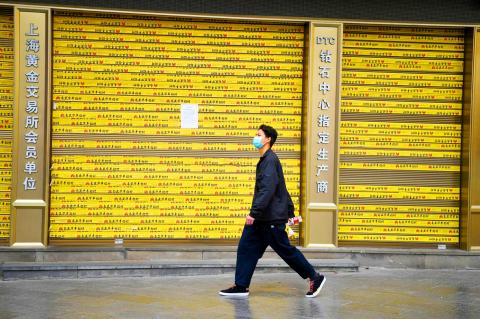The global cost of the novel coronavirus (2019-nCoV) outbreak could be three or four times that of the 2003 SARS outbreak, which sapped the world’s economy by US$40 billion, the economist who calculated that figure said.
The sheer growth in the Chinese economy over the past 17 years means that the global health emergency triggered by the 2019-nCoV outbreak has far greater potential to gouge global growth, Australian National University economics professor Warwick McKibbon said in Canberra.
“It’s just a mathematical thing,” McKibbon said in a telephone interview. “Most of the GDP loss that we saw in the SARS model, and in reality, was China slowing down. And so, with China much bigger, you’d expect the billions would be much bigger.”

Photo: Reuters
While difficult to pinpoint a precise cost as the crisis is still unfolding, the effects would be experienced mostly through changes in “human psychology,” he said.
“Panic is what seems to be the biggest drain on the economy, rather than deaths,” he added.
McKibbon’s forecasts are in line with those of other analysts.
Nomura International forecast that the negative effects on China’s growth could exceed those seen during the SARS outbreak.
Real GDP growth in the first quarter could “materially drop” from the 6 percent pace in the fourth quarter of last year, maybe by even more than the 2 percentage-point quarterly deceleration seen in the second quarter of 2003, Nomura economists led by Lu Ting (陸挺) wrote in a report to clients.
“Back in 2003, China accounted for just 4 percent of global GDP. Fast forward to 2020 and its share has increased to 17 percent. That means the global spillover if China’s growth slumps will be larger,” Bloomberg economists Chang Shu (舒暢), Jamie Rush and Tom Orlik said.
“Hong Kong stands out as the most exposed — our simulation shows a hit of 1.7 [percentage points] in the first quarter. South Korea and Vietnam would also suffer, each slowing by 0.4 [percentage points]. Japan would take a 0.2 [percentage-point] hit,” they said.
More contagious than SARS, but less deadly, the insidious nature of 2019-nCoV is such that it often presents as mild cold-like symptoms and can go undetected, which could potentially protract the crisis for longer than the 2003 epidemic.
The new virus, which emerged in central China late last year, has reportedly infected more than 8,200 people in two months, eclipsing the 8,096 SARS cases reported from November 2002 through early 2003, when the contagion spread from China across Southeast Asia and to North America and Europe.
“If a country had a bad epidemiological outcome, then their shocks were likely be a lot bigger than countries that were able to control it well,” McKibbon said, referring to his findings from examining the financial effects of SARS.

CROSS-STRAIT COLLABORATION: The new KMT chairwoman expressed interest in meeting the Chinese president from the start, but she’ll have to pay to get in Beijing allegedly agreed to let Chinese Nationalist Party (KMT) Chairwoman Cheng Li-wun (鄭麗文) meet with Chinese President Xi Jinping (習近平) around the Lunar New Year holiday next year on three conditions, including that the KMT block Taiwan’s arms purchases, a source said yesterday. Cheng has expressed interest in meeting Xi since she won the KMT’s chairmanship election in October. A source, speaking on condition of anonymity, said a consensus on a meeting was allegedly reached after two KMT vice chairmen visited China’s Taiwan Affairs Office Director Song Tao (宋濤) in China last month. Beijing allegedly gave the KMT three conditions it had to

STAYING ALERT: China this week deployed its largest maritime show of force to date in the region, prompting concern in Taipei and Tokyo, which Beijing has brushed off Deterring conflict over Taiwan is a priority, the White House said in its National Security Strategy published yesterday, which also called on Japan and South Korea to increase their defense spending to help protect the first island chain. Taiwan is strategically positioned between Northeast and Southeast Asia, and provides direct access to the second island chain, with one-third of global shipping passing through the South China Sea, the report said. Given the implications for the US economy, along with Taiwan’s dominance in semiconductors, “deterring a conflict over Taiwan, ideally by preserving military overmatch, is a priority,” it said. However, the strategy also reiterated

‘BALANCE OF POWER’: Hegseth said that the US did not want to ‘strangle’ China, but to ensure that none of Washington’s allies would be vulnerable to military aggression Washington has no intention of changing the “status quo” in the Taiwan Strait, US Secretary of Defense Pete Hegseth said on Saturday, adding that one of the US military’s main priorities is to deter China “through strength, not through confrontation.” Speaking at the annual Reagan National Defense Forum in Simi Valley, California, Hegseth outlined the US Department of Defense’s priorities under US President Donald Trump. “First, defending the US homeland and our hemisphere. Second, deterring China through strength, not confrontation. Third, increased burden sharing for us, allies and partners. And fourth, supercharging the US defense industrial base,” he said. US-China relations under

The Chien Feng IV (勁蜂, Mighty Hornet) loitering munition is on track to enter flight tests next month in connection with potential adoption by Taiwanese and US armed forces, a government source said yesterday. The kamikaze drone, which boasts a range of 1,000km, debuted at the Taipei Aerospace and Defense Technology Exhibition in September, the official said on condition of anonymity. The Chungshan Institute of Science and Technology and US-based Kratos Defense jointly developed the platform by leveraging the engine and airframe of the latter’s MQM-178 Firejet target drone, they said. The uncrewed aerial vehicle is designed to utilize an artificial intelligence computer